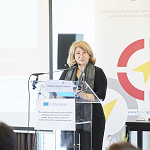The role of social financial intermediaries in deploying financial instruments under the European Social Fund in the 2014-2020 programming period
Overview
With their focus in the social sector, Social Financial Intermediaries (SFIs) play an increasingly important role in the implementation of financial instruments under the European Social Fund (ESF) across the EU. Member State investment priorities and thematic objectives outlined in the ESF Operational Programmes (OP) can be effectively delivered through financial instruments. These financial instruments enable an efficient use of resources and SFIs add value to their implementation, especially when providing microfinance to final recipients.

Picture: Ms Silvia Costa, Member of the European Parliament; Mr Bruno Robino, Head of fi-compass, European Investment Bank; Mr Baudouin Baudru, Cabinet expert, DG Employment, Social Affairs and Inclusion, European Commission
This fi-compass event ‘The role of social financial intermediaries in deploying financial instruments under the European Social Fund in the 2014-2020 programming period’, organised in Brussels on 17 October 2017 by the European Commission's Directorate General for Employment, Social Affairs and Inclusion (DG EMPL), in partnership with the European Investment Bank Group (EIB Group), focused on the contribution SFIs make in delivering support through ESF financial instruments.
Bruno Robino, Head of fi-compass, European Investment Bank, moderated the event, encouraging dialogue and exchanges of experience between participants and speakers.
The seminar was opened by Baudouin Baudru, Cabinet expert, European Commission's Directorate General for Employment, Social Affairs and Inclusion (DG EMPL), who gave an overview on the use of financial instruments and the European Fund for Strategic Investment (EFSI) as important additional resources to boost investments and deliver public policies in the social field. Ms Silvia Costa, Member of the European Parliament, stressed the need for a change in the social and economic environment and for closer relations between the public and private sectors to increase access to credit for the social sector. Mr Brando Benifei, Member of the European Parliament, talked about the importance of working on outreach to fund social stakeholders who do not have access to standard banking systems. He concluded by stating that it is important to take the social dimension into account during the negotiations for the next Multiannual Financial Framework, as "there is no Europe without the social dimension".

Picture: Mr Baudouin Baudru, Cabinet expert, DG Employment, Social Affairs and Inclusion, European Commission; Mr Bruno Robino, Head of fi-compass, European Investment Bank
Participants were given a global overview of the social economy and the role of international financial institutions by Mr Nicolas Tritaris, Principal Banker, EU Funds Co-financing, European Bank for Reconstruction and Development and Ms Monica Brezzi, Director for Assessment and Monitoring, Council of Europe Development Bank. This prompted discussions on the availability of guarantees to enable commercial banks to provide finance for social loans, including for social housing and labour mobility. Equity was seen as another product that could be further developed for the social economy.
The role of social financial intermediaries in addressing investment needs in the social economy, microfinance and other related ESF areas was highlighted by Loris di Pietrantonio, Head of Unit F.1 – ESF and FEAD, DG EMPL. He also noted the activities carried out by DG EMPL and the EIB through the fi-compass platform including the tailored approach to accompany managing authorities throughout the life cycle of a financial instrument. Helmut von Glasenapp, Secretary-General, European Association of Long-Term Investors (ELTI), Pedro Manuel Sasia Santos, President, European Federation of Ethical and Alternative Banks and Financiers (FEBEA) and Marc Schublin, Microlux Volunteers Coordinator, Microlux, Luxembourg gave further details on the roles and contributions of their institutions. Participants were interested in prospective developments to bridge the public/private divide in supporting social objectives and in ways of investing more in social enterprises.

Picture: Ms Andriana Sukova-Tosheva, Director, DG Employment, Social Affairs and Inclusion, European Commission
The role of the EFSI and the contribution of the EIB Group in supporting the social economy were explained by Frank Lee, Head of Financial Instruments Advisory, European Investment Bank. He also outlined the outlook and vision of fi-compass to fully exploit the potential of financial instruments under the ESF. Ulrich Grabenwarter, Deputy Director, Equity Investment, European Investment Fund (EIF) showcased the EIF equity programmes, the use of the EFSI programme, and the provision of capacity building to Business Angels who can then bring social enterprises to scale. The expected improvements in the efficiency of EFSI from the Omnibus regulation were noted in discussions with participants, along with ways that financial products can support low, or no profit businesses when combined with non-financial support.
Ways of implementing ESF financial instruments supporting the social economy and the implications for social intermediaries were presented by Alessandro Messina, CEO, Banca Populare Etica, Italy and Michał Radziwiłł, President of the Board, Towarzystwo Inicjatyw Społeczno-Ekonomicznych SA (TISE), Poland. Guadalupe de la Mata, Resident Representative for Spain and Portugal, EIF, outlined the innovative Madrid pilot project, which consists of using ESF funds as a contribution to EaSI under article 38.1(a) of the CPR. Participants were also interested in hearing more about ways to measure social impact, as well as the delivery of soft support.
Examples of best practices and perspectives for a stronger financial inclusion in delivering ESF support and microfinance in Europe were given by Jorge Ramirez Puerto, General Manager, European Microfinance Network (EMN) and Giampietro Pizzo, President, RITMI (Italian Microfinance Network).
Andriana Sukova-Tosheva, Director, DG EMPL, in her closing address remarked on the notable achievement of this unique event: by gathering all levels of stakeholders, the European Commission helped create awareness about financial instruments and the social sector across Europe. She noted that financial instruments and social financial intermediaries are key to achieving broader social and political goals.
Bruno Robino highlighted the strong messages of the event, including how micro and macro social finance require business development services. He reminded participants of the support for stakeholders from the EIB through fi-compass and capacity building services available for ESF managing authorities and delivered by fi-compass.
| Title | Speakers | ||
|---|---|---|---|
| |
Social economy – global overview and role of IFIs |
Mr Nicolas Tritaris, Principal Banker, EU Funds Co-financing, European Bank for Reconstruction and Development |
|
| |
Social economy – global overview and role of IFIs |
Ms Monica Brezzi, Director for Assessment and Monitoring, Council of Europe Development Bank |
|
| |
Investment needs in social economy, microfinance and other related ESF areas – the role of social financial intermediaries |
Mr Helmut von Glasenapp, Secretary-General, European Association of Long-Term Investors (ELTI) |
|
| |
Investment needs in social economy, microfinance and other related ESF areas – the role of social financial intermediaries |
Mr Pedro Manuel Sasia Santos, President, European Federation of Ethical and Alternative Banks and Financiers (FEBEA) |
|
| |
Investment needs in social economy, microfinance and other related ESF areas – the role of social financial intermediaries |
Mr Marc Schublin, Microlux Volunteers Coordinator, Microlux, Luxembourg |
|
| |
EIB Group in supporting the social economy and role of EFSI |
Mr Frank Lee, Head of Financial Instruments Advisory, European Investment Bank |
|
| |
EIB Group in supporting the social economy and role of EFSI |
Mr Ulrich Grabenwarter, Deputy Director, Equity Investment, European Investment Fund |
|
| |
Implementing ESF financial instruments supporting the social economy |
Mr Alessandro Messina, CEO, Banca Popolare Etica, Italy |
|
| |
Implementing ESF financial instruments supporting the social economy |
Mr Michał Radziwiłł, President of the Board, Towarzystwo Inicjatyw Społeczno-Ekonomicznych SA (TISE), Poland |
|
| |
Implementing ESF financial instruments supporting the social economy |
Ms Guadalupe de la Mata, Resident Representative for Spain and Portugal, European Investment Fund |
|
| |
ESF and microfinance in Europe: best practices and perspectives for a stronger financial inclusion |
Mr Jorge Ramirez Puerto, General Manager, European Microfinance Network, (EMN) |
|
| |
ESF and microfinance in Europe: best practices and perspectives for a stronger financial inclusion |
Mr Giampietro Pizzo, President, RITMI (Italian Microfinance Network) |

